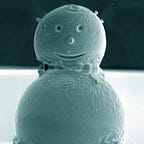Terasem workshop in Second Life, July 20: David Orban
Terasem’s 12th Annual Workshop On Geoethical Nanotechnology will take place as usual on July 20 in the Terasem sim, Second Life, with top speakers including David Orban, founder of Network Society Research, faculty member and advisor at Singularity University,
Other speakers: space activist and social entrepreneur Yalda Mousavinia, co-founder of Space Cooperative, scientist, tech consultant and top science fiction writer David Brin, and of course Terasem co-founder Martine Rothblatt.
David’s talk is titled “The Biosphere Is A Small Subset Of The Technosphere And Will Grow With It.” Abstract:
In approximately 3.5 billion years of evolution the biosphere grew to cover all of the surface of Earth. But in vertical it only extends about a mile or two, to be generous, in both directions from sea level. Going up oxygen becomes scarce, going down light is stopped by the solid surface almost immediately, and in a few hundred yards by water.
Through solar energy, space based manufacturing, underground LED hydroponics, we can radically extend the volume in which biocompatible environments can allow organic life to thrive, and to sustain the human-technological hybrid civilization.
Earth’s carrying capacity is a hundredfold what we believe it is!
Through engineered nanorobots to suitably process the chemical and mineral composition of the soil within which to establish the fractal maze of 3D environments, the same approach can be applied to Martian colonies, too.
An abundant mindset, which leverages human creativity and the full potential of our technologies, can recognize the perils of the blind experiments we are already running on a planetary scale, and embrace the responsibility of open and directed developments that benefit all of the biosphere, giving it vast new opportunities unreachable by the casual attempts of natural selection.
David was kind enough to answer some questions:
The Earth, the Moon, or Mars?
All of the above! And more! We must stay curious and passionate about our future, which will include space, not as the next frontier, but the next series of environments with which to confront our ingenuity and desire to solve our challenges.
How can a Network Society help protecting and stewarding our planet?
Decentralized networks are able to evolve more resilient communities that leverage technologies at the edge, experimenting, iterating solutions, sharing best practices globally in a borderless, interconnected world.
How can a Network Society help going to the stars?
We are, from the Internet of Things, to blockchain, to Articificial Intelligence, putting together approaches that are eminently applicable to space exploration, and to radically redesigned approaches to how we can establish colonies in the solar system and beyond.
Are we getting close to The Diamond Age described by Neal Stephenson, or is nanotech a failed dream?
Nanotech is what powers our bodies. Nature took billions of years to evolve it. If it takes us a few hundred, it should not be surprising, and we can still be proud of the results.
Where are those nanobots that Eric Drexler promised?
As Paul Saffo says, “Never mistake a clear view for a short distance”. They are here in our future, unavoidably.
Please come and listed to David on July 20, and ask more questions!
Terasem’s 12th Annual Workshop On Geoethical Nanotechnology
Using Geoethical Nanotechnology to Combat Climate Change
Thursday, July 20, 2017
10:00AM — 1:00PM PDT/1:00PM — 4:00PM EDT/6:00PM — 9:00PM GMT
Terasem Island Conference Center in Second Life
[SLURL — click here to teleport to Terasem]
Feel free to explore Terasem Island in Second Life (just install a Second Life viewer and then click the link above) before the workshop, and feel free to contact me for help.
Pictures from David Orban.
